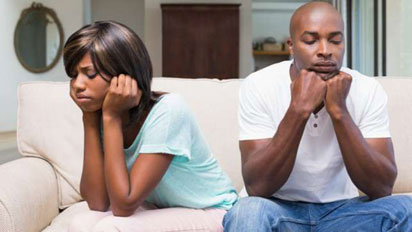 For men, the realization of the fact that erectile problem has suffice could be so devastating to the concern person, since this is naturally perceived as a challenge to the very essence of masculinity and all the pride of manhood cum “respect” that assumedly go with it. Notwithstanding this much about the reality of failure of the penis to respond to sexual stimuli, I venture to plead on the side of caution against self-blame or taking extreme measures like suicide that sometimes occur in some cases.
For men, the realization of the fact that erectile problem has suffice could be so devastating to the concern person, since this is naturally perceived as a challenge to the very essence of masculinity and all the pride of manhood cum “respect” that assumedly go with it. Notwithstanding this much about the reality of failure of the penis to respond to sexual stimuli, I venture to plead on the side of caution against self-blame or taking extreme measures like suicide that sometimes occur in some cases.
Erectile dysfunction (layman’s term: Impotence) is medically defined as “the persistent or recurrent inability to achieve or maintain an erection sufficient for satisfactory sexual activity.”
Now to details, the above definition might mean that the male partner cannot have an erection when he try to have intercourse, or that his erection is not firm enough for intercourse, or that he loses his erection soon after intercourse starts. “Persistent” and “recurrent” problems with sexual intercourse might occur every time one tries to have sex, or only some of the time.
In practice, I have also came across cases that has to do with selective erection failure, where the guy cannot just get it up when it comes to having intercourse with an established partner but erection during sexual fantasies and sometimes with other women.
Seek professional help
It is important to note, and stress, that having symptoms of erectile dysfunction is not the end of the world; there is more to life than reducing its essence to one’s ability to copulate. At any rate, erectile issues in male are readily treatable these days with a variety of medications and psychotherapies as applicable.
However, before considering a treatment for erectile dysfunction, the concerned individual and the partner should be sure of the actual cause of the erectile dysfunction. So, it is better to see a doctor, who should able to tell for sure what the problem is before prescribing an erectile dysfunction treatment. It is very important to also note that “experiencing occasional difficulties with achieving an erection does not necessarily mean ones has Erectile Dysfunction” as a continuum entity, sometimes, it might as well be a natural break, that soon start function the next moment.
Another factor that might help one to understand whether one’s partner has erectile dysfunction is whether either partner are troubled by this pattern of sexual activity. As mentioned above, a few occasions of being unable to have anerection sufficient for satisfactory sexual activity does not however mean that the partner has erectile dysfunction. Many men have one or more episodes of being unable to have an erection probably due to fatigue, distraction, alcohol, over-excitement etc without developing erectile dysfunction. But a persistent pattern of difficulty is a cause for concern.
Telltale signs
A telltale sign may be that the man begins to avoid sexual contact or intimacy because he is unhappy with his sexual performance. He may stop initiating sex, or ignore the partner’s hints or suggestions. Or he may become anxious during sexual encounters, and his anxiety makes it even more difficult to get an erection. Related to these is that depression, shame, embarrassment and frustration are also common feelings.
It is very important to stress here that erectile dysfunction is a couple’s problem. Even though it is the male partner that has the physical symptom, it affects the couple’s relationship, and is a problem for both partners. Hence, if one of the sexual partners is concerned that there might be a sexual problem, it is worth following up with the other partner in order to take necessary steps to solve the problem.
Hence, in seeking treatment for erection-related issues, learning more about sexual health may be the first step in restoring ones sexual wellbeing vis-a-visimproving the quality of life and enjoying sex once again. It is thus important to note that treatments help one to experience the kind of satisfying intimacy one once had can help restore confidence as well as one’s entire relationship with his partner.
Don’t suffer in silence
It is not out of place to feel a little uncomfortable talking to the doctor about erectile dysfunction.
Notwithstanding the above, keep in mind that one has as much right to ask for medical help for erectile dysfunction as you do for any other health condition. There is no reason one and his partner should suffer the effects of erectile dysfunction in secrecy. Note that erectile dysfunction is a condition that many doctors now routinely treat.
Commonly the general medical practitioner is usually the first healthcare professional one speaks to about impotence related issues. If the doctor of first call does not seem comfortable or interested in discussing erectile dysfunction, then see another doctor; note that this is not uncommon with some conservative-minded doctors, who unduly mix their personal beliefs with their professional resource. Depending on your situation, the doctor may refer one to the urologist (a surgeon that specialized in male genital and urinary problems), asexual therapist or to other related specialists.
Another important point about discussing erectile dysfunction with a doctor is the fact that erectile dysfunction may have a serious underlying cause, such as undiagnosed diabetes, heart disease, or prostate cancer, which might be revealed with medical interaction.
Treating erection problem
Before starting any medication or other treatment for erectile dysfunction the following lifestyle modifications may be recommended where needed. [myad]






